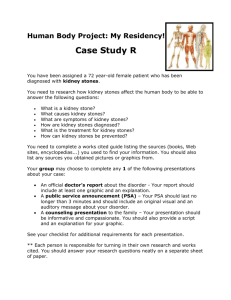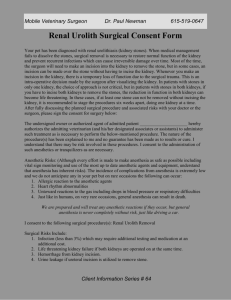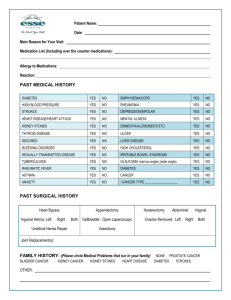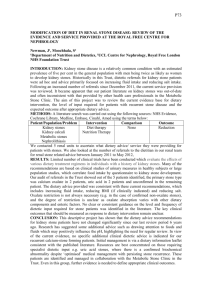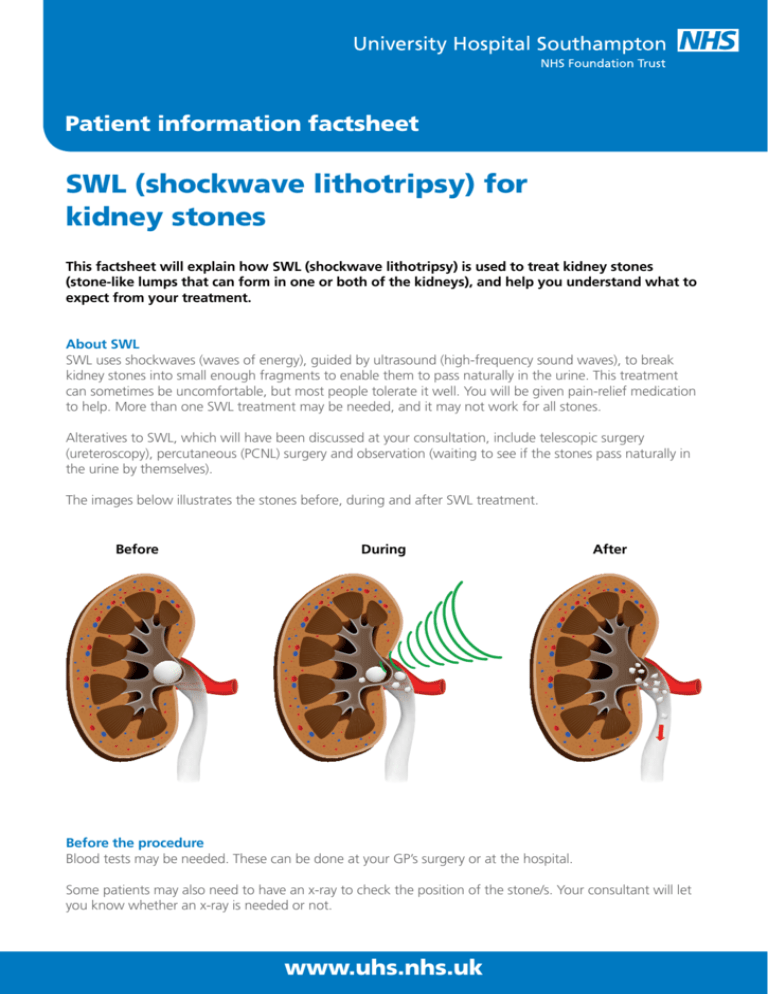
Patient information factsheet
SWL (shockwave lithotripsy) for
kidney stones
This factsheet will explain how SWL (shockwave lithotripsy) is used to treat kidney stones
(stone-like lumps that can form in one or both of the kidneys), and help you understand what to
expect from your treatment.
About SWL
SWL uses shockwaves (waves of energy), guided by ultrasound (high-frequency sound waves), to break
kidney stones into small enough fragments to enable them to pass naturally in the urine. This treatment
can sometimes be uncomfortable, but most people tolerate it well. You will be given pain-relief medication
to help. More than one SWL treatment may be needed, and it may not work for all stones.
Alteratives to SWL, which will have been discussed at your consultation, include telescopic surgery
(ureteroscopy), percutaneous (PCNL) surgery and observation (waiting to see if the stones pass naturally in
the urine by themselves).
The images below illustrates the stones before, during and after SWL treatment.
Before
During
After
Before the procedure
Blood tests may be needed. These can be done at your GP’s surgery or at the hospital.
Some patients may also need to have an x-ray to check the position of the stone/s. Your consultant will let
you know whether an x-ray is needed or not.
www.uhs.nhs.uk
Patient information factsheet
Before your treatment
You must inform the urology team (call the number at the end of this factsheet) at least two weeks before
your procedure if any of these apply to you:
• any type of heart condition
• an artificial heart valve, coronary artery stent, heart pacemaker/defibrillator or any other implanted
foreign body
• an artificial blood-vessel graft
• neurosurgical shunt
• an artificial joint
• you have or have had an MRSA infection
• you are at high risk of variant CJD (corneal transplant, neurosurgical dural treatment or injections of
human-derived growth hormone)
• you have a known allergy to ciprofloxacin, trimethoprim, diclofenac or ibuprofen
• you are or may be pregnant
Aspirin, clopidogrel or warfarin
If you take aspirin, clopidogrel or warfarin you must discuss this with your urologist (specialist doctor).
You will be asked to stop taking these five to ten days before your treatment.
Getting to and from your SWL appointment
You should not drive for 24 hours after the procedure, as the pain relief medication may affect your
concentration, so we suggest you arrange in advance for somebody to collect you. If you have driven
to your appointment and haven’t made any arrangements for somebody else to drive you home, it may
affect the type of pain relief we can give you, and we may need to postpone your treatment. If you have
a medical condition which means you need hospital transport then please arrange this through your GP
surgery in advance.
On the day
You can have a light breakfast on the day of the procedure. You can continue to drink clear fuid (such as
water or weak squash) up until two hours before the treatment starts. When you arrive you will be asked
to put on a hospital gown. Your treatment lasts for about 40 minutes but you should be prepared to be in
the department for up to three hours.
You will be given injections, tablets and suppository preparations of pain relief, anti-sickness and antibiotic
medications. You will be awake during the procedure. You will be monitored throughout by a nurse and
a lithotripsy technician. Your stone will be identified by ultrasound and/or x-ray and then the shockwave
treatment will start. This makes a loud clicking noise and is often said by patients to feel like being flicked
with a large elastic band.
After the procedure
You will need to wait about an hour after the procedure to ensure you are urinating well. You will urinate
some blood. This is normal.
If you wish to travel abroad, you should inform your travel insurer that you have kidney stones. If your
treatment is planned close to a holiday/business trip then the treatment should be postponed.
You might have severe pain (renal colic) as the stone fragments pass through your ureter (tube between
your kidney and bladder). There is also a small risk of these stones getting stuck in the ureter, occasionally
needing emergency hospital admission.
www.uhs.nhs.uk
Patient information factsheet
When you go home
• we advise you to rest for 24 hours after the treatment
• some patients experience pain after treatment, this is usually when stone fragments pass from the kidney
to your bladder
• you may be given ibuprofen 400mg (painkiller), to take three times a day for a week, if appropriate
• sometimes the stone that is broken up may be infected. To prevent any infection spreading you will be
given antibiotics to take twice a day for seven days. It is important that you complete this course. If you
have an allergic reaction to this then let your GP know so that they can put you onto another antibiotic.
• after the procedure you should drink plenty of fluid, preferably water. Aim for two to three litres (six
pints/15 cups/10 mugs) in the first 24 hours. This will help clear the urine of stone fragments and blood.
Side effects
You may experience:
• blood in the urine for a few days
• pain in your kidney
• urinary infection
• bruising or blistering of skin
• need for further SWL treatment
• sometimes the treatment may not break up very hard stones, meaning you may need alternative
treatment
Less common side effects include:
• severe infection requiring intravenous antibiotics
• kidney damage or blockage requiring exterior kidney drainage (nephrostomy)
• stone fragments becoming stuck between kidney and bladder requiring surgery
• kidney damage (this is rare)
• recurrence of stones
Concerns
You must contact your GP immediately if you have any concerns or any of the following apply to you:
• you develop a temperature
• you feel generally unwell
• you are vomiting
• you have severe pain on urination
• you are unable to urinate
• any bleeding increases
If your GP is closed you should go to your nearest emergency department.
www.uhs.nhs.uk
Patient information factsheet
What happens next?
You will have a follow-up appointment in the urology stone clinic four to twelve weeks after treatment
(depending on size and location of your stone).
Plan
Further information
If you have any further queries then please contact the urology department on 023 8120 8455 or email
urologysurgerynurses@uhs.nhs.uk
If you need a translation of this document, an interpreter
or a version in large print, Braille or on audio tape, please
telephone 023 8120 4688 for help.
© 2015 University Hospital Southampton NHS Foundation Trust. All rights reserved. Not to be reproduced in whole or in part without the permission of the copyright holder.
Version 1. Published May 2015. Due for review May 2018. 2014-658
www.uhs.nhs.uk

